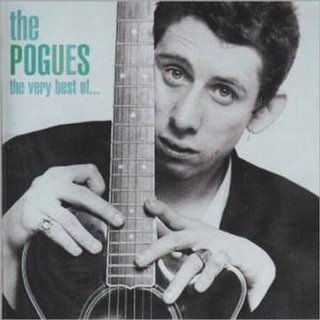Squawk Radio
Sunday, September 24, 2006
Liz Brings out the Fall Music
 I once read a description of the Pogues as “The Sex Pistols meets the Chieftains.” But that’s totally wrong. The way the Pogues sing about drinking, they’re actually the Sex Pistols meets the Clancy Brothers. There just isn’t another group like them anywhere. And with autumn just around the corner, I'm ready for music like this.
I once read a description of the Pogues as “The Sex Pistols meets the Chieftains.” But that’s totally wrong. The way the Pogues sing about drinking, they’re actually the Sex Pistols meets the Clancy Brothers. There just isn’t another group like them anywhere. And with autumn just around the corner, I'm ready for music like this.I’ve wanted to blog on the Pogues for a long time, but it was really, really, really hard to narrow it down to one album, because everything this band has done has been phenomenally good. So I finally settled on one of several “best of” CDs that they’ve released. And the reason I chose this one is because it includes my two favorite songs by them, “Sally McLennane” and “Sick Bed of Cuchulain.” The fact that “Fairy Tale of New York” (on which the amazing Kirsty MacColl joins them) also appears, is an excellent bonus.
The collection starts off deceptively, with “Dirty Old Town,” a slow, sad-sounding number that might lead the listener to believe s/he’d purchased an album of traditional Irish folk music. But the beauty of the Pogues is that singer/songwriter/poet Shane MacGowan turns tradition on its ear with his in-your-face, often very angry lyrics. The second song, “The Irish Rover,” picks up the pace nicely, but still doesn’t quite capture what is the truest sound of the band. That comes next with “Sally McLenane,” which combines this joyful, danceable music with lyrics about death and alienation, and then comes to fruition with “Sick Bed of Cuchulain,” whose lyrics are much more graphic: “When you pissed yourself in Frankfurt and got syph down in Cologne/And you heard the rattling death trains as you lay there all alone...”
And that, really, is the Pogues. You have music that is centuries old, the purest kind of acoustic folk ever produced in Ireland, right down to the fifes and drums. And then you have the lyrics. Yeah, Irish music can be sad and angry. But the Pogues don’t even try to romanticize the bleakness and ugliness that life can bring. “The Old Main Drag” depicts a grim world of junkies, and “Hell’s Ditch” shows us a side of prison life nobody wants to talk about.
But not all of it is hopeless, and not all of it is ugly. Some of the songs, like “Misty Morning, Albert Bridge” and “London Girl” have music and lyrics are genuinely beautiful and melancholy. And much of their oeuvre is representative of not just the Irish experience, but the human experience. (Though certainly the band is a strong voice for what its countrymen and -women have survived.) The CD is a bit uneven in the way it moves from slow to fast, so that you never quite feel like you get a rhythm going, but then, that would probably suit the Pogues just fine. I’m thinkin’ they wouldn’t want listeners to get too comfortable.
Elizabeth Bevarly, 11:00 AM
10 comments